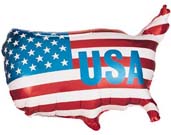How the net redrew the US political map
 San Francisco - In the ten years since the internet became an integral part of mainstream life, it has revolutionized the way millions of people work, shop, chat and learn.
San Francisco - In the ten years since the internet became an integral part of mainstream life, it has revolutionized the way millions of people work, shop, chat and learn.
But it was not until 2008 that the net revolutionized the political system and allowed a promising black politician to rise from an obscure state senator to president elect in just four short years.
Few pundits ever gave Barack Obama much of a chance against a formidable field of better known, better funded and more experienced candidates in a political system that is strongly weighted to the advantage of political insiders and back-slappers.
But by using the internet to communicate, organize and raise money, Obama created a citizen army that was able to unseat the
According to federal records released in early December, Obama raised a record 770 million dollars for his election campaign. About half of it came from small donations of less than 200 dollars, more than likely made over the internet, but there is no break-down of what percentage represented online fundraising.
That staggering achievement may not be the most decisive impact of the internet on this year's election. According to political analysts, it was the huge flow of volunteers to Obama's website when he first started considering a White House bid that convinced him that he had a chance to defeat Senator Hillary Clinton, then the overwhelming favourite for the centre-left nomination.
As Obama's online network multiplied, it gave him a decisive edge in the primary battles against Clinton, allowing him to deploy thousands of volunteers on short notice and with devastating effect, said Joe Trippi, a Democratic campaign advisor and online political guru.
Four years ago, Trippi developed many of the techniques used so effectively by Obama's 100-strong web team for a different candidate, Howard Dean, who failed in his
2004 bid for the Democratic nomination. Allied with the broader technological base of 2008, the extreme desire for political change and Obama's unique charisma, those techniques became political gold.
According to the Pew Research Centre, Obama's campaign website consistently attracted about three times the traffic of the website of his general election opponent, Republican Senator John McCain.
On Facebook, Obama had 2.2 million 'friends' compared to 745,000 for McCain. On MySpace, Obama had 588,000 friends compared to McCain's 188,000.
Obama's web team, which included Chris Hughes, the 24-year-old co- founder of Facebook, also did a thorough job of integrating online activities with real world actions.
They reached out to supporters through a multitude of platforms - from emails to SMS messages, and from viral videos to posts on the new medium of the moment, the Twitter cellphone network. It proved crucial in organizing supporters and volunteers to create what many believe was the best voter turnout operation in election history.
Obama even took out ads embedded in video games, urging voters to head early for the polls. And he used the internet to immediately refute smears by his opponents.
After his inauguration on January 20, Obama will be the first high-tech president.
He is the first to regularly use email and a Blackberry, presenting problems to those who must guard the security of presidential communications.
But it will be a boon to citizens hoping to keep track of the first tech president. His advisors are already showcasing how they intend to use the power of online organizing to govern.
They have started posting YouTube videos of his weekly national address, and hope to organize his campaign supporters into a permanent political force. Last month for instance, Obama campaign manager David Plouffe asked the estimated 11 million members of Obama's e-mail list to rank the goals of the new administration.
"Your hard work built this movement," Plouffe wrote. "Now it's up to you to decide how we move forward." (dpa)